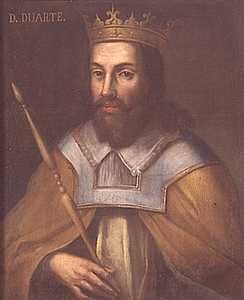Kings, Healers, and Poets

Let me tell you a bit about King Edward of Portugal, and then I'll explain a bit about how he might impact your fantasy campaign.
When I was reading up on analysis of medieval nutrition last week, one of the articles that I came across was something rather interesting. First, let me tell you a bit about King Edward of Portugal, and then I'll explain a bit about how he might impact your fantasy campaign.
Edward lived and ruled in the 1400's, a period on the border of the middle ages and the renaissance and a fascinating time in Europe. Technology had advanced to the upper limits of what we often see in medieval fantasy: the crossbow was nearing the end of its dominance of the battlefield, firearms like the arquebus were being deployed, the trebuchet had long since replace the catapult and was already fading away, and just that year the Chinese invented the first true toilet paper, although it was still available pretty much only to the uppermost ranks of society. He took the throne in his early 40's, and ruled for a mere five years before dying of "the plague" (to the best of my knowledge, nobody is certain which plague it was). During his reign, he was noted to be a patron of the sciences and of exploration; Edward was a model of the adventurer-hiring royalty that populate our game worlds (and if you'd like to read a bit about one of the true adventurers of his era, read a bit about his brother, Henry the Navigator). He was, by all accounts, a rather poor military thinker, but nobody can master everything and historians believe he got some very bad advice from some very persuasive advisors. He was a poet, a scholar, and at the time of his death is believed to have been making relatively progressive revisions to Portuguese law. Interestingly, records indicate that Edward also had a fascination with medicine, and in fact, it's been suggested that he was actually a hypochondriac who sought to learn as much as possible about illness because he believed he suffered from all manner of diseases. In his own writings, he describes what appear to be symptoms of his own depression, although to my reading, he falls short of qualifying as suffering from a major depressive disorder. I don't speak or read Portuguese, so I haven't read the original sources, but translations of his work shed some insight into how plague and sickness was actually seen by the educated men and women of his era.
For those who don't want to have to track down or wade through the primary sources, this open-access article presents some of the material from Edward's writings, mostly those related to mental health, as understood from a modern context. Among other things, Edward discusses various approaches to treating depression, based on what worked for him, and he also discusses fear and anxiety in a manner very atypical of his era, in that he admitted that the nobility and knightly orders were capable of it.
Part of what makes Edward's writings fascinating is the way that he understands both physical and mental illness as diseases of both the body and the soul. When discussing both the plague that killed his father and the chronic sadness that he himself suffered from, Edward speaks of physical sickness that can respond to physical treatments, but he also speaks of the "sin of sadness that proceeds" and that exorcism may be an effective treatment. In Edward's time, formal medical training for healers did exist in some parts of the world, and the belief that illness was the result of sin or demonic intervention, though still powerful in Europe, was waning. Edward gives the modern reader some insight into how scholars of his time were reconciling these differing points of view, and although this single time point makes it hard to know how the different understandings were evolving over time, we can perhaps speculate that what we're seeing is a sign of the waning dominance of the religious understanding of sickness.
It's very easy to imagine a figure like Edward being a major figure in a campaign. An Edward-like character might be the ruler of a kingdom, a powerful but overwhelmed merchant, a mayor or a simple scholar. He might interact with a group of PCs as a local healer who has knowledge of the workings of a plague, or he might be a wealthy patron who contracts the PCs to go off and explore a vast forest that no one has previously penetrated, and his medical knowledge is secondary to his fascination with expanding the map of the known world. Such an NPC is all too often a two dimensional caricature in our games, but Edward, who left volumes of writings behind, gives us the opportunity to shape our characters after a living and vibrant person. Nothing gives a character life like giving it some elements of a very real and very complicated person.
More than four years ago, Dr. Eris Lis, M.D., began writing a series of brilliant and informative posts on RPGs through the eyes of a medical professional, and this is the one that appeared here on January 12, 2014. Lis is a physician, gamer, and author of the Skirmisher Publishing LLC OGL sourcebook Insults & Injuries, which is also available for the Pathfinder RPG system.






